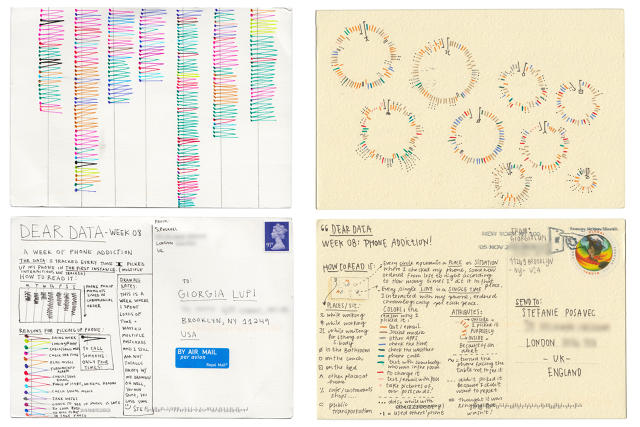Two years ago, designers Stefanie Posavec and Giorgia Lupi met at a design festival in Minneapolis, where they were both giving talks on drawing and sketching with data. They kept in touch online after connecting over their shared artistic, analog approach to visualizing numbers. Because they’d switched continents—Lupi moved to Brooklyn to start the New York office of her company Accurat, Posavec moved to London for studies and love—they decided to embark on a yearlong, hand-drawn pen pal project, called Dear Data, in which they send each other regular postcards that visualize a week’s worth of personal data.
“What we wanted to prove with the project is that data can be totally human,” Lupi says in a phone interview. “Of course, especially with hand-drawing, it can be imprecise and messy, but our lives are imprecise and messy.” With the designers’ beautiful illustrations, the project puts an analog spin on the self-quantification craze. Instead of piles of numbers that may or may not be useful in your quest for self-actualization, this data becomes more like an unusually attractive diary. “I don’t write—I’m not someone who keeps a journal—but this documentation is a source of nice memories,” Lupi says.

Here’s how it works: every week, Lupi and Posavec decide via text on a behavior to quantify for the next seven days. They then start recording this personal data in analog notebooks, Evernote, and in self-quantifier extraordinaire Nicholas Felton’s Reporter app, which helps you track virtually any behavior. Now in their eighth week, they’ve so far tracked their spending habits; their use of mirrors; their use of clocks; how often they say thank you or get thanked; how often they complain; their phone addictions; and their physical contact with people. For the latter, Posavec visualized 23 people in her life as plants and each instance of physical contact as a petal on the person’s plant, creating a poetic garden of her interpersonal relationships. At the end of the week, Posavec and Lupi transform these data sets into elaborate hand-drawn visualizations on postcards, then mail them across the pond. They’re also chronicling it all on a blog.

Lupi discovered a prominent observer effect—the idea that the act of observation changes the behavior of whatever’s being observed. When she began recording how often she said “thank you,” Lupi says her mind started playing tricks on her. “You start noticing you’re about to say thank you before it comes out of your mouth, and then you can decide not to say it,” she says. But the process still yielded insight: “I realized I say thank you to a huge number of strangers, but I never thank the people I know,” she says. “I think this is very common. So I started to say more thank yous to my boyfriend, and less thank yous to waitresses.” The week of tracking complaints also inspired her to catch herself whenever she started complaining and to try to focus on something positive.
“These postcards are fragments that, together, compose a self-portrait,” Lupi says. The pen pal aspect makes the project a rare example of self-quantification driving connection instead of obsessive inward focus: in Lupi and Posavec’s hands, data has become a tool for developing a friendship. “We’ve only met twice in person, but I feel like we’re getting to know each other,” Lupi says.
Check out the Dear Data blog, updated weekly, here.
[via Brainpickings]
[All Images: Stefanie Posavec/Giorgia Lupi]